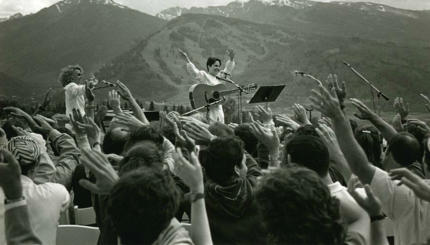In the New York neighborhood where I live, Friday afternoons are marked by the near-simultaneous call of the muezzin from the local mosque, and an alarm that marks the imminent approach of Shabbat. grocery stores sit adjacent to Mexican restaurants, and signs are as likely to be posted in Yiddish or Spanish as in English. There are Jewish proprietors who speak fluent Spanish, and Bangladeshi convenient stores that stock a wide array of kosher products.
New York is like that, sometimes. Proximity causes margins to bleed, creating mash-ups and hybrids that would be impossible anywhere else.
 The Hip Hop Hoodios, led by Josue Noriega (aka Josh Norek) and Abraham Velez, have found their home amidst the linguistic and musical chaos of the big city. Employing klezmer, salsa, cumbia, guitar rock, and a rotating cast of well-known Jewish and Hispanic musicians, the Hoodios are polyglot musical omnivores, their plate filled to overflowing with fresh sounds. The Colombian Norek and Puerto Rican Velez, who were both also born and raised Jewish, have been recording together since 2001, when both Norek and Velez were involved in the Latin-music industry (Norek as a publicist, Velez as a writer).
The Hip Hop Hoodios, led by Josue Noriega (aka Josh Norek) and Abraham Velez, have found their home amidst the linguistic and musical chaos of the big city. Employing klezmer, salsa, cumbia, guitar rock, and a rotating cast of well-known Jewish and Hispanic musicians, the Hoodios are polyglot musical omnivores, their plate filled to overflowing with fresh sounds. The Colombian Norek and Puerto Rican Velez, who were both also born and raised Jewish, have been recording together since 2001, when both Norek and Velez were involved in the Latin-music industry (Norek as a publicist, Velez as a writer).
They have attracted a crossover audience not necessarily limited to Jews in on their jokes. As they recently told an NPR interviewer, their fan base varies with each city; crowds as Los Angeles shows have been mostly Chicano, while New York audiences are comprised primarily of Jewish hipsters. Critics, though, have been united in their enthusiastic response to the Hoodios’ first full-length album, “Agua Pa’La Gente” (2004), and the band’s two EP’s. Their new album “Carne Masada” (2009) cobbles together their greatest hits, along with some new tracks, and is–of course–a product of New York City.

Help us keep Jewish knowledge accessible to millions of people around the world.
Your donation to My Jewish Learning fuels endless journeys of Jewish discovery. With your help, My Jewish Learning can continue to provide nonstop opportunities for learning, connection and growth.
If the single, “Times Square (1989),” with its shout-outs to former New York City mayor David Dinkins and former New York Mets center fielder Mookie Wilson, and its racket of wailing police sirens, weren’t hint enough, the sheer sonic cacophony of “Carne Masada” would tell the whole story. The Hoodios’ New York allegiances run deep. The Ferdinand-and-Isabella-bashing Inquisition jam “1492” builds to the shout “Forget Espana, want New Amsterdam.”
The Hoodios (their name echoes “Judios” and also signifies an allegiance to their ‘hood of choice) describe themselves as a “Latino-Jewish urban collective,” which means, in practice, that their sound makes no distinction between Hispanic and Jewish roots, Hebrew and Spanish, bad jokes about Mexicans and bad jokes about Israelis.
The obvious comparison is to the Beastie Boys, who cracked hip-hop’s glass ceiling, making it acceptable for three wisecracking New York Jews with a distinct lack of melanin, and a predilection for rapping about Hong Kong director John Woo and 1970s baseballer Rod Carew, to pose as rap stars. Hip Hop Hoodios are Beastie-esque smartalecks, no doubt, but their sonic palette is more focused–hip-hop beats, Latin rhythms, and Jewish samples–and their lyrical content is more jauntily Jewish. The Beasties never made a secret of their Jewishness, but it was never of as much interest to them as it was to others. Hip Hop Hoodios, in comparison, can think of little else.
Not Your Rabbi’s Jewish Music
The sheer density of the Jewish references on “Carne Masada”–musical and lyrical–is overwhelming. Religious songs, Hebrew melodies, klezmer clarinets, popular Jewish children’s ditties: all are tossed together, and with a great deal of humor. Hardly educational in affect, Hoodios prefer to inject their source material with a frisson of naughtiness.
The original writers of “The Dreidel Song” likely never anticipated its use in a rap called “Dicks and Noses,” nor could they have imagined the Hoodios’ metaphorical use of the word “dreidel” to mean–well, something else entirely. “You call me daddy, I call you ima/I want to take you right now on the bima,” they declare on “Hoodia Para Mi,” imagining a synagogue seduction. They announce they’re on the lookout for “a good Jewish whore,” then soften the approach by listing their specifications: “bat money and maternity hips.”
Sex is ever-present on “Carne Masada,” but it is not the only thing on the Hoodios’ minds. “No Nose Jobs” implores Jews to keep their magnificent schnozzes, asking them to refrain from “bailing out of the community and race you came from.” “Ocho Kandelikas” is a stomping rap-rock rendition of the classic Ladino song. And “Viva La Guantanamera,” with nothing particularly Jewish about it, echoes Cuban salsa singer Celia Cruz, and shouts out to salsa legend Hector Lavoe, while the lyrics riff on closing the American prison at Guantanamo Bay.
This is the sort of Judaism your rabbi most definitely would not approve of, which is precisely what makes it so entertaining. It’s the musings of boys who’ve spent too many hours crouched at an uncomfortable desk, listening to a Sunday-school teacher drone on. Now they’re fighting back by amusing themselves with what they know.
Cultural Cross-Referencing
With Hip Hop Hoodios, Spanish gives way to English, which gives way to Hebrew, with head-spinning fluidity. “Que Pasa in Israel” begins with an amusing confrontation between a Mexican wanting to visit Jerusalem, and the Israeli immigration officer interrogating him. The song is a declaration of allegiance to the United Nations of hip-hop, its musical style defiantly transcending all barriers of state and religion.
 Mutts themselves, Hoodios enjoy pointing out the absurdities of others’ fractious attempts at cultural purity. “Grandparents hate Arabs,” they wickedly observe on “Que Pasa,” “while our mothers wear scarabs”–an amulet common to the Middle East. The song pays tribute to Israel, and to Palestine, feeling no need for apology or recrimination. Hip-hop–at least the kind they make–knows no boundaries.
Mutts themselves, Hoodios enjoy pointing out the absurdities of others’ fractious attempts at cultural purity. “Grandparents hate Arabs,” they wickedly observe on “Que Pasa,” “while our mothers wear scarabs”–an amulet common to the Middle East. The song pays tribute to Israel, and to Palestine, feeling no need for apology or recrimination. Hip-hop–at least the kind they make–knows no boundaries.
Unsurprisingly, for a group devoted to cross-cultural pollination and multi-denominational alliance, Hip Hop Hoodios close with a jaunty tribute to President Barack Obama, set to the tune of “Heveinu
aleihem.” Half song of praise, half political prescription, “Shalom Obama” is a worthy conclusion to “Carne Masada,” and an unabashed statement of pride in the Hoodios’ world flowering outside their doors. In a world where a half-Kansan, half-Kenyan raised in Indonesia can be President of the United States, these “Spanish rapping Jews” are just another face of the American melting pot. They are also the face of the American Jewish future.


